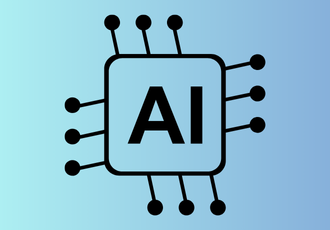AI is reshaping business process automation, making workflows faster, smarter, and more efficient. According to a recent EY survey, the adoption of generative AI in the workplace has surged from 22% in 2023 to 75% in 2024, demonstrating its rapid adoption across industries.
In the age of AI, process automation has evolved into something unimaginable a few years ago. AI now allows organizations to automate more complex tasks, such as fraud detection, customer interactions, and supply chain management, faster and more easily than ever before—streamlining everything from rules and steps to process creation. This transformation leads to reduced costs, fewer errors, and enhanced efficiency.
In this blog, we'll explore all about AI business process automation and the role FlowForma plays in optimizing organizational processes and workflows. Let’s dive in.
What Is AI Business Process Automation?
Business process automation isn't new, but the introduction of AI has changed what’s possible. With AI, process builders can access a vast knowledge base to design processes, generate new ideas, and accelerate process automation, all aimed at boosting efficiency.
AI business process automation (BPA) uses machine learning (ML) to analyze historical data, identify patterns, and accelerate process automation. As a result, workflows become dynamic and continuously improve, adapting seamlessly to new scenarios and evolving business needs.
Case Study:
Abingdon & Witney College faced challenges with paper-based processes across their multiple campuses, leading to inefficiencies and delays. By implementing FlowForma's AI-powered process automation tool, the organization digitized workflows such as trip and visit approvals, accident reporting, expense claims, and student risk assessments.
The results were impressive: the trips and visits process alone saved 1,665 hours. Furthermore, the automation enhanced visibility, reporting, and resource allocation, driving continuous improvement and greater operational efficiency.
 Digitize risk assessments, expense claims, and incident reporting with FlowForma.
Digitize risk assessments, expense claims, and incident reporting with FlowForma.
In this FlowForma 2025 Process Automation Webinar, I discuss predictions for the future of process automation and AI, highlighting the key trends and shifts that will shape how organizations use these technologies to drive efficiency, innovation, and business value.
Also, FlowForma’s latest guide, “AI and Process Automation 2025” offers predictions for the year ahead and actionable tips to help you future-proof your workflows.
What Are the Key Components of AI Business Process Automation?
The power of AI business process automation lies in its core technologies, enabling smarter, more efficient workflows. Here’s what makes it work:
1. Generative AI
Generative AI is the cornerstone of AI business process automation. In the case of FlowForma, Copilot and AI Summarization are powered by generative AI.

Caption: Checkout FlowForma playground—create processes in seconds by uploading diagrams or simple, contextual prompts
Alt-text: Screenshot of FlowForma playground
FlowForma Copilot is a business process assistant powered by Generative AI, available at all times to answer process-related queries and assist with automation journeys. AI Summarization automatically generates brief summaries of your forms, providing a clear overview of your processes at any given moment.
2. Machine learning & predictive analytics
Machine learning (ML) brings intelligence to business process automation with AI. It analyzes historical data to forecast future trends and automate decision-making. ML enables systems to learn from data, identify patterns, and make decisions or predictions without needing manual programming for each specific scenario.
For example, PayPal uses machine learning (ML) algorithms to detect and prevent payment fraud in real time. By analyzing transaction details, device data, and geolocation, the system swiftly identifies anomalies signaling fraudulent activities, allowing immediate action to protect users without disrupting legitimate transactions.
3. Agentic AI
Agentic AI in the context of business process automation refers to a personal assistant integrated into process flows. It allows users to automate tasks such as extracting data from documents, validating information, and performing specific actions.
For example, FlowForma's AI Agent can be set up with conditions, events, and straightforward instructions in plain English, allowing it to execute tasks efficiently. It can, for instance, extract essential details such as invoice amounts or supplier names, conduct sentiment analysis, or evaluate CV content based on specific criteria.
The AI feature, known as "AI Assistance," activates various tools such as the AI Agent, Summarize Agent, and Copilot. This tool integrates smoothly into processes, automating repetitive tasks and enhancing the product's value by empowering users to create custom AI-driven workflows.
In this example from our recent AI workflow masterclass, we showcase how an AI agent can analyze data and provide recommendations based on its insights.
4. Natural Language Processing (NLP)
NLP enables automation systems to understand and interact naturally with human language, significantly enhancing customer interactions and document processing.
For example, KLM Royal Dutch Airlines implemented a chatbot to enhance customer service on social media platforms.
5. Robotic Process Automation (RPA) with AI
While RPA traditionally automates repetitive, rule-based tasks, adding AI transforms it into a smarter, cognitive solution capable of handling exceptions dynamically.
Why Is AI Important for Modern Business Automation?
AI is redefining business automation, making processes smarter, faster, and more efficient. Here’s why it’s essential for modern enterprises:
1. Streamlines workflows
AI business process automation enables businesses to simplify and accelerate workflows, thereby enhancing operational agility by reducing manual intervention and minimizing human errors. McKinsey highlights impressive results businesses have achieved by integrating AI into their distribution operations:
- 20-30% reduction in inventory levels
- 5-20% decrease in logistics costs
- 5-15% savings in procurement spending
A practical real-world example would be Downer, a construction company, which automated 23 processes using FlowForma Process Automation, saving over 3,350 development hours and enhancing operational efficiency across various business units.
 Boost efficiency with AI-powered automation—digitize purchase requests, timesheets, and compliance workflows.
Boost efficiency with AI-powered automation—digitize purchase requests, timesheets, and compliance workflows.
2. Improves accuracy and reduces errors
Manual business processes such as data entry, reporting, and compliance checks often lead to inaccuracies. AI-powered platforms like FlowForma help businesses replace manual workflows with automated, accurate digital processes.
Coinford, one of the UK's leading engineering firms, digitized and automated more than 76 complex workflows using FlowForma’s AI-enabled platform. By eliminating paper forms and automating manual data entries, Coinford significantly reduced errors, increased operational accuracy, and improved compliance across multiple departments.
3. Data-driven decision making
One of the most powerful impacts of AI is its ability to turn data into actionable insights. Organizations regularly use AI-driven predictive analytics for critical tasks, including:
- Forecasting customer demand and market trends
- Optimizing resource allocation and inventory management
- Identifying opportunities for innovation and growth proactively
With real-time analytics at their fingertips, decision-makers are empowered to respond to changing market conditions swiftly and effectively, gaining a decisive competitive advantage.
AI-Powered Automation vs. Traditional Automation in Business
AI is transforming automation from rigid rule-based processes to intelligent, adaptable workflows. Here’s how it compares to traditional automation:
1. Efficiency & accuracy
When it comes to precision and speed, AI automation outperforms traditional rule-based systems significantly. Unlike standard automation, which simply repeats predefined actions, AI analyzes data patterns and proactively identifies anomalies, dramatically reducing errors.
For example, American Express uses AI-driven automation to analyze billions of transactions annually, detecting fraudulent activities in real time. This has allowed them to identify and prevent approximately $2 billion in potential fraud each year.
2. Adaptability to changing business needs
Business environments change rapidly, and traditional automation systems struggle to keep up, often requiring manual reconfiguration. AI, on the other hand, learns from real-time data and evolves automatically, continuously improving its responses to changing conditions.
For example, Netflix continuously adapts its recommendation engine based on real-time user data, personalizing viewer experiences and achieving substantial engagement—saving the company nearly $1 billion annually by anticipating viewer preferences.
3. Cost & implementation complexity
AI-driven solutions demand a higher initial investment compared to traditional automation due to sophisticated infrastructure and training costs.
JPMorgan Chase's implementation of the Contract Intelligence (COiN) platform exemplifies AI's transformative impact on business processes. COiN automates the review of complex legal documents, a task that previously consumed 360,000 hours of human labor annually, by interpreting these documents in seconds.
5 Ways AI Is Transforming Various Aspects of Business Automation
AI is no longer a futuristic concept; it is transforming how businesses operate across industries. Here’s how AI is reshaping business automation today:
1. Revolutionizing customer service
AI-driven chatbots and virtual assistants are reshaping customer interactions by offering instant responses and seamless experiences. Companies implementing business process automation with AI are seeing reduced human manual intervention, improved accuracy, and faster decision-making.
Bank of America’s AI-powered virtual assistant, Erica, has handled over 1.5 billion interactions, assisting customers with transactions, spending insights, and financial planning. By automating responses and analyzing customer data in real-time, Erica reduces the need for live agent support while providing a seamless banking experience.
This not only saves time but also improves customer satisfaction by providing immediate, consistent support.
2. Streamlining financial workflows with AI
In the financial sector, the use of AI in business processes significantly enhances several critical functions, including renewals, approvals, product lifecycle management, invoice processing, expense management, and corporate expenditure (CoPEX) tracking.
For example, Grant Thornton used FlowForma to automate key processes like job appraisals, client acceptance, and data access requests. This AI-backed automation reduced inefficiencies and improved process speed by 60% while ensuring compliance and better transparency.

Improve process visibility and governance by automating job appraisals, client approvals, and mobile requests.
3. Transforming recruitment and HR operations
AI-powered automation in HR is transforming recruitment and workforce management. It simplifies tasks like resume screening and candidate matching by quickly analyzing large volumes of resumes to identify top candidates, reducing hiring time and improving match accuracy.
Using HR automation tools, organizations can digitize and streamline key business processes such as employee onboarding, performance appraisals, leave management, training tracking, and expense claims, enhancing efficiency and accuracy across HR and business operations.
In this interactive demo, you'll see how FlowForma Copilot can build a HR onboarding process in minutes.
4. Enhancing healthcare operations
AI is transforming healthcare workflows by automating routine tasks, improving compliance, and optimizing operations. Key applications include:
- Patient administration automation: Automates intake forms, appointment scheduling, and insurance claims, reducing paperwork and manual errors.
- Enhanced provider focus: Ensures compliance while freeing clinicians to spend more time on direct patient care.
- Compliance management: Standardizes medical documentation and tracks referrals, minimizing errors and delays.
- Operational optimization: Uses analytics to improve patient flow, resource allocation, and overall operational efficiency.
5. Improving compliance management
Compliance is a critical aspect of business operations, especially when dealing with strict regulations such as GDPR (General Data Protection Regulation), HIPAA (Health Insurance Portability and Accountability Act), and SOX (Sarbanes-Oxley Act). Managing these regulatory requirements manually can be time-consuming and error-prone.
AI-driven automation helps businesses stay compliant by digitizing policy enforcement, automating audit trails, and reducing the risks of human oversight.
Also read: Learn more about how Aon, a global insurance broker, standardized processes across business units, improved audit readiness, and significantly reduced compliance risks with FlowForma.
Implement AI Process Automation in your Business with FlowForma
Adopting AI in business processes has become essential for companies aiming to improve efficiency and maintain a competitive edge. Solutions like FlowForma offer an all-in-one business process automation platform with powerful features, such as:
- AI Copilot: AI Copilot automates decision-making, optimizes workflows, and provides predictive analytics to identify potential bottlenecks. It continuously learns from past actions to improve decision accuracy and process efficiency, enabling smarter, faster business operations.
- No-code: The AI-powered no-code platform empowers business users to design, automate, and modify workflows without relying on IT, enabling quicker deployment.
- Workflow builder: With FlowForma’s intuitive workflow builder, users can easily create, deploy, and manage AI-enhanced workflows. Effortlessly automate everything from simple to complex processes with FlowForma's AI-powered platform, which seamlessly integrates forms, workflow automation, insights, and document generation.
Moreover, FlowForma integrates seamlessly with existing systems, ensuring smooth data flow and enabling businesses to build on their current technology stack without disruption.
Curious to learn more? Book a demo or sign up for a free trial to see FlowForma in action.

 By
By 




